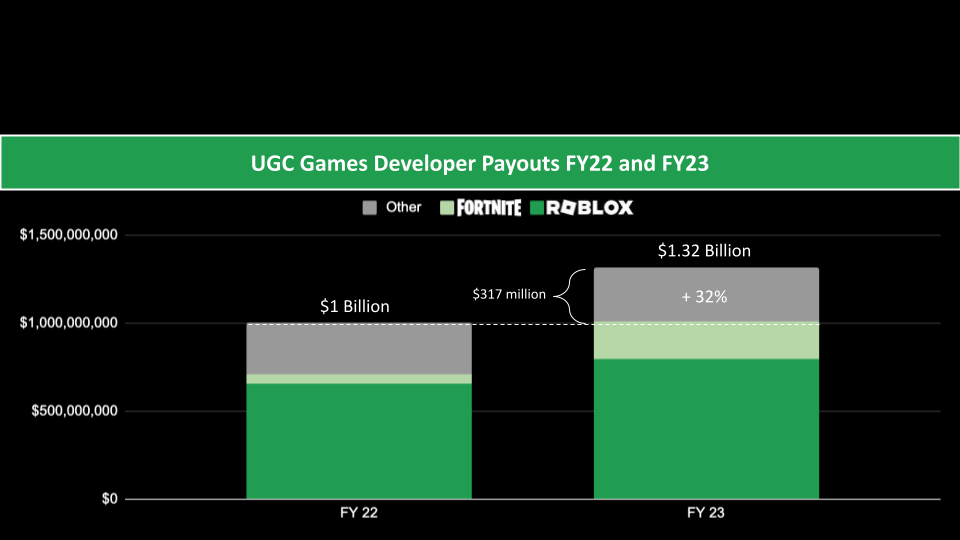Bedding Insights
Exploring the latest trends and tips in bedding and sleep comfort.
From Gamers to Innovators: The New Era of User-Generated Gaming Markets
Discover how gamers are reshaping the industry into a thriving marketplace of innovation and creativity in the new era of user-generated gaming!
How User-Generated Content is Shaping the Future of Gaming Markets
User-generated content (UGC) is rapidly transforming the landscape of gaming markets, driving engagement and fostering communities like never before. With platforms such as Twitch and YouTube providing gamers the ability to share their experiences and creations, players now have a significant role in shaping game development and marketing. This democratization of content allows developers to tap into a wealth of ideas and feedback directly from their audience, creating a more tailored gaming experience. As a result, games that embrace UGC often see increased player retention and community loyalty, ultimately leading to greater success in the competitive gaming market.
The influence of user-generated content extends beyond just gameplay; it is also redefining how games are marketed and monetized. Developers are leveraging platforms for community engagement, allowing players to share their in-game achievements and creations, promoting word-of-mouth and organic reach. Furthermore, many gaming companies are integrating UGC directly into their marketing strategies, utilizing fan-made content in promotional materials or featuring community creations in-game. This symbiotic relationship not only strengthens brand loyalty but also fosters a vibrant ecosystem where creativity flourishes, setting the stage for the future of gaming markets.

Counter-Strike is a popular first-person shooter game known for its competitive gameplay. Players can choose to play as terrorists or counter-terrorists in various missions. For those looking to enhance their gaming experience, utilizing a daddyskins promo code can provide access to exclusive skins and items.
The Rise of Player-Driven Economies: Opportunities for Gamers and Developers
The emergence of player-driven economies in gaming has transformed the way both gamers and developers interact with virtual worlds. Players are no longer simply consumers of content; they are also contributors to the economic landscape of games. This shift creates numerous opportunities for gamers to profit from their skills and investments. For instance, in popular online games like Decentraland and Axie Infinity, players can buy, sell, and trade in-game assets, effectively turning gameplay into a lucrative side hustle. Such economies not only foster a sense of ownership but also encourage a deeper engagement with the game's ecosystem.
For developers, the rise of player-driven economies presents a unique set of challenges and opportunities. Game designers can leverage these economies to enhance user retention and monetization strategies. By implementing robust trading systems and supporting community-driven marketplaces, developers can create environments where players feel invested in the game’s success. Moreover, as players assume roles as creators and merchants, developers can benefit from valuable feedback and ideas that can help enhance the game experience. As such, embracing player-driven economies might be the key to crafting engaging, sustainable games in the future.
What Does It Mean to Be a Creator in the New Age of Gaming?
In the rapidly evolving landscape of gaming, being a creator means embracing a multifaceted role that goes beyond traditional development. Today's creators are not only responsible for crafting immersive stories and engaging gameplay but also for building vibrant communities around their work. This shift has been fueled by the rise of platforms such as Twitch and YouTube, where gamers can share their experiences and cultivate an audience. Creators are now seen as influencers who shape the gaming culture, often blurring the lines between player and developer.
The new age of gaming enables creators to leverage innovative tools and technologies, such as virtual reality and user-generated content systems, to enhance their creative output. By harnessing these advancements, creators can provide unique experiences that resonate with their audience. Furthermore, the democratization of game development through accessible software and educational resources has empowered aspiring creators to explore their ideas, fostering a diverse range of voices in the industry. Ultimately, being a creator in this dynamic environment means being adaptable, collaborative, and open to new possibilities.